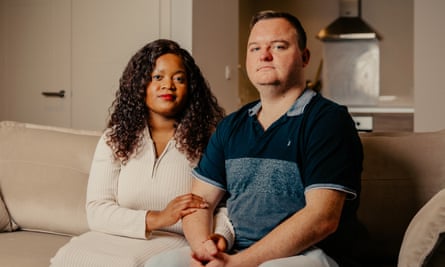Fertility patients are being forced to destroy embryos because they cannot afford to transfer or store them during the cost of living crisis, experts have said.
Dr Catherine Hill, Fertility Network UK’s head of policy and public affairs, spoke of a “dire situation for fertility patients” who struggled to get help on the NHS and were then forced to turn to the expensive private sector. She said rising inflation had made it much harder for couples “racking up mountains of debt”.
Hill said patients were reporting getting to the point where they could not afford to continue to pay for treatment. She said: “They are not getting help from the government and clinics will not help them.”
The UK fertility watchdog said it was concerned by these reports, urging all private clinics to be clear on treatment costs.
Clare Ettinghausen, the director of strategy and corporate affairs at the Human Fertilisation and Embryology Authority (HFEA), said the regulator was concerned that any patient was limited in their treatment choices by the cost of storage or transfer of embryos.
She said: “The majority of fertility patients pay for their own treatment, and this can be very expensive. Clinics should give clear information about treatment costs, including any future costs such as storage or embryo transfer to patients before they start treatment.”
A survey by the Fertility Network UK of almost 200 patients found 95% were experiencing or had experienced financial worries in relation to fertility treatment. For 92%, these problems were being or had been exacerbated by the cost of living crisis.
Half of respondents said a combination of the cost of living crisis, the lack of NHS-funded help, and the high cost of private care meant they were unable to move forward with fertility treatment. Nearly a quarter are delaying or cancelling treatment.
One patient, who wanted to remain anonymous, told the charity they had “one frozen embryo left that we spent two years saving for”. They said: “We now cannot afford to have that embryo transferred. Next month, the year’s freezing expires so we will have to try to find the money to pay for another year’s freezing or our embryo will be destroyed.”
The Fertility Network UK is calling on the government to dismantle what it calls an “IVF postcode lottery” in which certain NHS areas offer more cycles than others.
Hill said: “We are also calling on fertility clinics to support patients more during this time and look to pause the price rises that come at the end of the year, or the start of the new year.
“Patients are facing the destruction of embryos as they cannot afford transfer or storage fees”. Hill said in these instances clinics should pause payments.
Another patient, who asked to remain anonymous, told the charity: “Our mortgage term is due to end soon, and we cannot know whether we will be able to afford the roof over our heads, let alone pay for a transfer. This is absolutely unmanageable and the fertility industry must do something to keep treatment affordable in these trying times.”
In the UK, the NHS group Nice recommends that women aged under 40 should be offered three IVF cycles if they have been trying to conceive for two years. Nevertheless, the Fertility Network said only 13% of areas offered this, and 65% offered just one cycle.
READ RELATED: My mind was poisoned by diet culture. Then I tried weightlifting | Zing Tsjeng
Laura’s story
Balancing the cost of IVF with daily living expenses is a challenge, one woman said – and this was a patient who has so far only experienced treatment on the NHS. Laura Jones, 29, says even though she is getting help via the health service, she has so far spent £1,500 on mental health support, as well as fees for a private progesterone prescription, due to concerns her levels were low.
“The NHS will not cover that,” she said. “If you have NHS funding, they won’t allow you to ask for the extra prescription.”
after newsletter promotion
The cost of storing her two remaining embryos is £300 a year, Laura explained. “It’s a big chunk of money to pull out.”

Laura and her partner, Jack, 30, would never get rid of her embryos, even if it meant missing bill payments for the month. “I am so desperate for this,” she said, but she knows couples who have had to quit treatment due to financial pressure.
One patient, speaking anonymously, told the Fertility Network UK they had to re-mortgage their house and borrow £15,000 from an external credit company to start IVF privately. “We have four remaining embryos frozen, which are our last hope of having our own children, and we cannot currently afford to have them transferred … which is devastating,” they said.
Laura said one of her best friends had to get rid of embryos due to the yearly storage costs. “She did not want to pay for it with no guarantee it would work,” she added.
Laura has endometriosis but they also face male-factor infertility, with her partner’s sperm low on motility, morphology and count.
The couple had their second round in March 2021, after the first failed cycle due to complications that meant the doctors were not able to extract enough eggs. When this did not work, Laura said it was “heart-wrenching”. For the next embryo transfer, she was prescribed progesterone privately, but it also failed.
“Going forward – we are facing possibly £10,000 for a fresh new cycle if these two embryos are not successful … Or we have to go outside the UK for possibly half the cost … We have to save and ask families to help and chip toward it all.”
“The hardest part for me is mentally [the feeling] afterward,” she said. “Not enough people realise that the body changes after IVF and you go through so much. I had suicidal ideation after all of it,” she said.
Laura would like women to be better informed about the whole process of IVF, as well as the financial toll. “For me, this is really important, and also I would like the NHS to make sure you feel like an individual as opposed to a number.”





